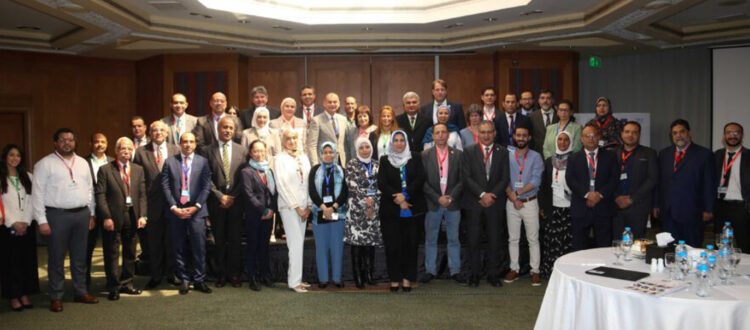SwitchMed Project Confers “Plastic Pollution Control” in its first Round Table
“Plastic Pollution Control” was the title of the Round Table on Sustainable Consumption and Production co-convened by CEDARE, WMRA & UNEP on May 9, 2023. As a global priority, Plastic Pollution Control comes as well on top of the Egyptian government’s national agenda today. The Round Table, which was held back-to-back with the Launching event of SwitchMed II Project at Semiramis InterContinental Hotel, Cairo, brought together 85 stakeholders and experts from relevant ministries including the Ministry of Environment, Ministry of Trade & Industry, Ministry of Foreign Affairs, Ministry of Transport, Suez Canal Authority, international developmental organizations, large supermarket chains and big retailers, financial institutions, technology centers, chemical and plastic manufacturers affiliated to the Federation of Egyptian Industries, FMCG manufacturers and retailers and academia.
In session 1, speakers gave an overview on plastic pollution at both global and local scales and deliberations involved limitation in light of the technical, economic, social scenes in Egypt. Local plastic waste; particularly plastic bags, estimated at 32 billion bags annually, are waiting for appropriate waste management system. Adopting a circular economy approach would certainly extend the life-cycle of the bag and increase its thickness. Speakers also discussed the role of the commercial sector in limiting the use of SUPBs, and technology transfer in the field of plastic packaging industry.
Meanwhile, international development organizations shared their experiences through similar projects working in parallel contexts. Synergies with the Project’s action plan is currently arranged. It’s becoming a doubtless fact that one of the most urgent steps would be raising the awareness about minimizing the consumption of single-use plastics and advocating the use of alternatives.
While Session 1 covered the “Pollution resulting from excessive use of Lightweight Plastic Bags and actions to limit their use”, Session 2 addressed the “Pollution resulting from Plastic Packaging Materials”; namely, the challenges and solutions associated with Marine plastic pollution and the legislative systems. More importantly, the inclusion of articles on waste management for the first time in law no. 202 for 2020 and its executive regulations was underlined as a very influential legislative achievement aiming to protect the environment from plastic waste. It is worth mentioning that phase I of SwtichMed Project in Egypt was behind laying the foundation for that achievement. Discussions also tackled the environmental determinants in the industry of plastic packaging materials and how to transform it into a green industry in addition to the need for an efficient extended producer responsibility (EPR) system.
The following are the recommendations based on the imperative input of the participants throughout the two sessions of the Round Table:
Egypt has taken thoughtful steps towards reducing pollution resulting from the use of SUPBs by enacting binding legislation and technical specifications. However, applying a collaborative approach between different stakeholders is the key to effective implementation of the developed strategy.
The need for progressive implementation of legislation side by side with comprehensive campaigns to raise the customer’s awareness and direct him/her to choose between using the multi-use bag or paying the value of the single-use bag.
Commercial chains can create motivation campaigns and develop an incentive system that fits their process and is acceptable by their customer.
In addition to the customers of the commercial chains, there is a broad base of users that should be targeted by the awareness companies.
The importance of the role of the media in the success of the implementation of the measures.
Technical and financial support for the recycling industry, along with an effective waste collection system, are the main solutions to the issue of plastic waste pollution.
The informal sector is an obstacle to sound waste management processes.
The industrial sector is able to adopt the production of environmentally friendly alternatives. However, it is important first to create real market demand.
Incentives must be named and identified for alternative producers.
In case of expected violation of the statutory text or decisions, the local governor or the local council can issue decisions in the form of fees, having the power of law.
The importance of applying EPR to regulate recycling activities.
A codified gradual use of recycled materials along with virgin ones should support the reduction of plastic waste.
Technology transfer should not be limited to manufacturing equipment; it should include the range of chemicals used with raw plastics.
The need for more in-depth study and regional coordination on trans-boundary pollution in both regional and international waters.
The need for more efforts on a global scale to control microplastic emissions.
Organizing competitions on innovative material and technology designs as well as waste collection can support efforts to reduce the use of SUPs.
SwtichMed II Project aims at accelerating Sustainable Consumption and Production, Circular Economy and Blue Economy. Executed in eight Southern Mediterranean countries, the Project is implemented in Egypt by CEDARE in partnership with the Ministry of Environment and UNEP and supported by SwitchMed; the EU funded programme.

